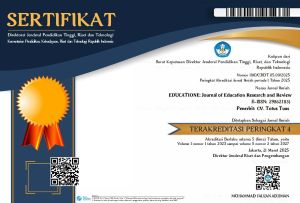PRINCIPAL LEADERSHIP AS A CATALYST FOR TEACHER PERFORMANCE IMPROVEMENT IN PRIMARY EDUCATION
DOI:
https://doi.org/10.59397/edu.v3i2.88Keywords:
Collaboration, Instructional Leadership, School Management, Teacher Performance, Qualitative ResearchAbstract
Educational leadership plays a pivotal role in shaping school quality, especially in contexts with limited resources. In Indonesia, despite ongoing reforms, many public schools still struggle with gaps in teacher performance due to weak coordination, insufficient recognition, and minimal external support. This study aims to explore the relationship between instructional leadership by the principal and teacher performance at State Elementary School 33 in Ternate City. Using a qualitative research design, data were collected through semi-structured interviews, classroom observations, and document analysis to capture contextual realities and leadership dynamics. The findings reveal that effective instructional leadership—defined by classroom supervision, recognition of teacher efforts, collaborative decision-making, and strategic resource management—positively influences teacher motivation, administrative compliance, and instructional quality. Teachers responded positively to the principal’s hands-on leadership and participatory approach, while supervision cycles and administrative support enhanced accountability. The study concludes that even in funding-constrained environments, instructional leadership remains a key driver of school improvement. Its strength lies in fostering a collaborative school culture, aligning teacher practices with national standards, and supporting continuous professional growth. The results offer valuable insights for school leaders, policymakers, and educational researchers seeking practical leadership strategies to enhance teaching quality in similar socio-educational contexts. Future studies are encouraged to adopt a longitudinal design and expand the sample to include comparative analyses across diverse regions and school types.
Downloads
Published
How to Cite
Issue
Section
Citation Check
License
Copyright (c) 2025 EDUCATIONE

This work is licensed under a Creative Commons Attribution 4.0 International License.



















